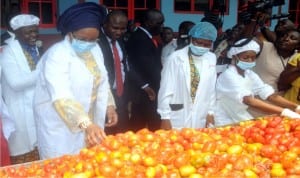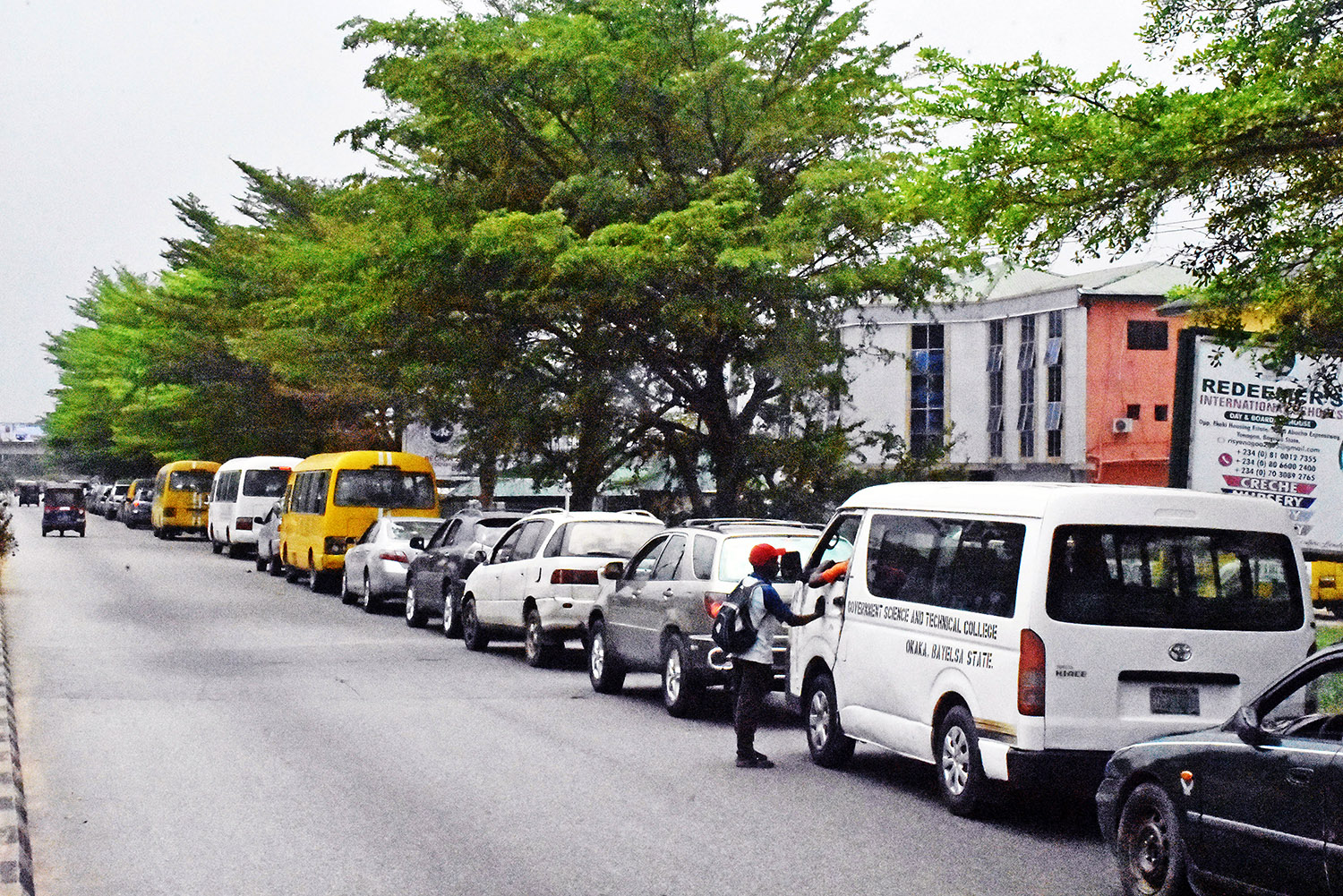Business
Re-engineering Tomato Processing For National Sufficiency

Wife of the President, Mrs Aisha Buhari (2nd left), inspecting fresh tomatoes at the inauguration of Erisco Foods Tomato Paste Revolution, in Lagos, recently. With her is President/Chief Executive of Erisco Foods Ltd., Chief Eric Umeofia (left).
In December 2015, Mrs
Sarah Smith, like most women agonised over the high cost of tomatoes in the market which marred her Christmas shopping due to paucity of funds arising from the economic downturn of the country.
However, upon her visit to the market in February 2016, she was dumbfounded by the reduced price of a basket of tomatoes occasioned by the alarming glut of the produce.
She said: “In December, I bought a basket of tomatoes from Mile 12 market at N21, 000, a produce I had bought between N6,500 and N8,000 in the previous months.
“Now, a basket of tomatoes goes for between N2,500 and N4,000 in the same market due to excess supply leading to huge waste of the produce because of its perishable nature.
“How I wish I could buy a lot and store in my freezer for the rainy season when tomatoes are usually pricey, but the epileptic power supply in the country will not allow that’’.
This situation is one of the many that tomato price fluctuations has caused, raising concerns to many homemakers for a pragmatic approach to reduce waste through preservation of the excess produce.
According to the Federal Ministry of Agriculture and Rural Development (FMARD), Nigeria is the 13th largest producer of tomato in the world and the second after Egypt in Africa.
Nigeria has a domestic demand for tomatoes put at 2.3 million tons, while it produces only 1.8 million tons annually.
However, due to the dysfunctional agricultural value chain system, about 50 per cent of the tomato produced is wasted due to lack of preservation, poor handling system, poor distribution channels and lack of easy access to markets.
The situation has resulted in tomato waste of over 750, 000 tonnes and an import bill of N16 billion annually to make up for the shortfall in local production.
According to experts, the panacea to reduce tomato waste is to preserve the excess supply through local processing into juice, paste, ketchup, puree and powder form.
The country’s Ministry of Agriculture puts the annual local demand for tomato paste at 900,000 tonnes.
Sadly, Nigeria is forced to rely on import of tomato puree, mostly from China because of lack of adequate processing plants.
Currently, most of the tomato processing plants in Nigeria are non- functional, ranging from Manto Tomato Processing Plant in Gombe State and Wanunne Tomato Processing Plant in Benue.
Others are Galf Tomato Factory in Jigawa State, Lau Tomato Processing Company in Taraba, Savannah Integrated in Borno and Perfect Integrated Foods Industry Ltd situated in Ondo State.
Data from FMARD reveals that the non-functional plants have processing and packaging capacities ranging from 7.0 to 1,050 metric tons of tomato paste per day.
Unarguably, lack of tomato import control, unstable power supply, inadequate assessment of market and supply chain channels are some identified factors that led to the absence of processing plants.
To mitigate these problems and ensure wastage is curtailed during glut, indigenous companies have risen to the challenge by reviving one of the moribund processing plants and investing in the industry.
Notably, the Ikara Food Processing Plant in Kaduna which had been moribund for over two decades was resuscitated in 2014 through a Public-Private Partnership between the state government and Springfield Agro Ltd.
The Ikara Tomato Company was established in 1981 by the Balarabe Musa administration. The company has an installed capacity for processing 16,950 tons of tomato and 700 hectares of land purposely for tomato farming.
As at today, the company’s tomato paste production from fresh tomatoes is put at 20 metric tons daily.
Following the trail of Ikara Food Company in tomato processing in Nigeria is Erisco Foods Ltd.
The Chief Executive Officer of Erisco Foods, Chief Eric Umeofia, said the plant has an installed production capacity of 450,000 metric tonnes per annum in its Lagos factory alone, making it the biggest in Africa and 4th largest in the world.
“The Erisco Foods revolution in tomato paste production will stop the annual wastages by over 75 per cent of fresh tomatoes across Nigeria.
“If we continue with the good policies of the present administration, there will be nothing like tomato glut anywhere in Nigeria in the next two years.
“We as off-taker will produce and process to meet our local demands and export to earn foreign exchange provided government continues to support manufacturing.
“Our backward integration programmes planned for Jigawa, Sokoto and Katsina states will generate employment and prosperity for 50,000 Nigerians within three years,’’ said Umeofia.
Also, Dangote Industries Ltd is not left out of the drive to boost the industrial sector of the economy with the establishment of Dangote Tomato Factory in Kadawa, Kano State.
The plant which will begin operation in March has a production capacity of 430,000 metric tonnes of paste per annum.
The factory requires 40 trailers of fresh tomatoes (1, 200 MT) each day to run at full capacity.
To strengthen the supply chain needed to improve tomato processing, the factory is collaborating with GEMS4 and the Tomato Growers Association in Kano.
Kano farmers supplying the factory means more sales, less waste and year-long demand for tomatoes even during the oversupply period.
Growth and Employment in States — Wholesale and Retail Sector (GEMS4) facilitates links between farmers and processing companies such as Dangote Factory and Ikara Food Company.
Its reach targets 100,000 farmers in Kaduna and Kano states.
GEMS4 is a 17 million pound market development project in Nigeria, funded by the World Bank and the U.K’s Department for International Development.
Its mandate is to facilitate market system changes to address identified constraints to encourage economic growth, resulting in the creation of 10,000 new jobs and increased incomes for 500,000 people, especially for the poor rural dwellers and women.
GEMS4 has been in implementation since 2012 and will be in operation until July 2017.
The project employs a “Making Markets Work for the Poor (M4P)’’ approach to implement initiatives that facilitates entry into markets.
It also provides technical support for the adoption of innovations, new business models and leverage investments for the development of key market facilities to support optimal business performance.
Mr Richard Ogundele, Intervention Manager for GEMS4, said that linking tomato farmers to processing plants initiative creates increased business choices for farmers by facilitating business linkages between small scale tomato farmers and tomato processing plants.
It enables them to serve each other on a commercial basis.
“The initiative also builds the capacity of farmers in good handling practices which ensures that incomes increase across the value chain.
“Proper handling, packaging and protection of their produce in a way that ensures quality, extends shelf-life and preserves sales value.
“Good quality produce attracts higher retail prices and financial losses from produce damage is prevented.’’
Similarly, an economist, Mr Adeoye Abiodun, decried Nigeria’s status as the largest importer of tomatoes as detrimental to economic growth and protection of local investments.
He said: “Available data reveals that the country has the wherewithal to meet local demands and even become a net exporter of the commodity.
“Importation of tomato paste to fill the local demand gap could be reversed with the right measures targeted at eliminating waste in the value chain’’.
Also, the Secretary to the Government of the Federation, Mr Babachir Lawal, said government would continue to support the growth of indigenous businesses, especially in this period of economic downturn.
He said that the current economic reality calls for a decisive policy thrust to address issues which must be realistic enough to leverage upon.
Ishola writes for the News Agency of Nigeria (NAN)
Oluwafunke Ishola
Business
Fuel Scarcity: IPMAN threatens shutdown over bridging claims

The Independent Petroleum Marketers Association of Nigeria (IPMAN) Depot Chairmen Forum, has exonerated its members from the current fuel scarcity in the country.
According to IPMAN, this is caused by its inability to source petroleum products.
The IPMAN Depot Chairmen Forum also threatened to withdraw its services over non-payment of N200 billion bridging claims by the Nigerian Midstream and Downstream Petroleum Regulatory Authority (NMDPRA) to its members, since 2022.
Alhaji Yahaya Alhassan, the Chairman, of the Forum said this while briefing newsmen in Abuja, yesterday.
Alhassan said the Nigerian National Petroleum Company Limited (NNPC Ltd.) was the sole importer of the product, but the marketers could not source products from NNPC Ltd. deport, rather from the private depots at high rate.
“We cannot buy fuel from the private depots at N950 and transport the product from Lagos to the North and other parts of the country with N2 million and still sell it at N900 or N1, 000.
“It is expedient for us to state that we are more pained by the non-availability of petroleum products in the country, which has given rise to another round of untold hardship for Nigerians.
“Contrary to claims that IPMAN members are hoarding Premium Motor Spirit (PMS) known as fuel, we would like to categorically state that PMS scarcity is wholly triggered by inability to get fuel from NNPC and not IPMAN,’’ he said.
Meanwhile, the NNPC Ltd. Chief Corporate Communications Officer, Olufemi Soneye said the disruption was due to logistical issues which had since been resolved.
“We currently have an availability of products exceeding 1.5 billion litres, which can last for at least 30 days. Unfortunately, we experienced a three-day disruption in distribution due to logistical issues, which has since been resolved.
“However, as you know, overcoming such disruptions typically requires double the amount of time to return to normal operations.
“Some folks are taking advantage of this situation to maximise profits. Thankfully, product scarcity has been minimal lately, but these folks might be exploiting the situation for unwarranted gain,’’ Soneye said.
He however, said the lines would clear out soon.
On the non-payment of bridging claims, the IPMAN forum said it was distressed and depressed by the laidback attitude of the NMDPRA towards the survival its member’s businesses, arising from its refusal in paying the claims.
“It is with deep frustration that we have assembled here today as the IPMAN Depot Chairmen Forum. It is also disheartening to note that some of our members have completely shut down businesses and retrenched employees.
“As businessmen and women, our members acquired bank loans to keep their fuel retail outlets running on a daily basis across the nooks and crannies of Nigeria in order to serve the teeming population of Nigerians,’’ Alhassan said.
He recalled that Sen. Heineken Lokpobiri, Minister of State Petroleum Resources (Oil), at a stakeholders meeting in February mandated the NMDPRA management to clear the entire debt in 40 days.
“However, today, we have crossed the 40 days’ time lapse given to the NMDPRA to clear the debt, and it is shameful to state that only the paltry sum of N13 billion has been paid, ignoring minister’s directive.
“We are not happy with the indiscriminate increment in the issuance and renewal of Sales and Storage Licence, by the NMDPRA, and the subsequent delays in acquiring the licence, which our members are recently subjected to.
“We are also calling on President Bola Tinubu to look into this unwholesome figure which is highly detrimental to our business and reverse it forthwith, as it is bound to impact negatively on the masses.
“We are poised to take far reaching decisions that may cripple the supply and sales of petroleum products across Nigeria if our demands are not met within the shortest period of time.
“We are collectively prepared to withdraw our services, shut down every single outlet, and suspend lifting of products forthwith till our demands are fully met, and the consequences will be terrible.
“We call on our members to however remain resolute and law abiding, even as we draw close to the immediate ultimatum for our demands to be met by the NMDPRA,’’ the chairman said.
Reacting to the IPMAN’s claims, the Acting Head, Corporate Communications, NMDPRA, Seiyefa Osanebi said the bridging claims payment was ongoing.
“The bridging claims payment is always an ongoing process,” she said.
Maritime
Shippers’ Council Registers 160 Port Operators

The Nigerian Shippers Council (NSC) says it has registered 160 Port stakeholders into its Regulated Port Service Provider and Users platform since the initiative began in 2023.
Executive Secretary, NSC, Mr Pius Akutah, made the disclosure on the sideline of a sensitisation programme by the commission for port operators in Lagos, with the theme, “Regulated Port Service Provider and Users”.
Represented by the Director, Consumer Affairs, Chief Cajetan Agu, Akutah emphasised the significance of the programme for stakeholders.
He said the sensitisation programme was the second edition after its commencement during the last quarter of 2023.
The Secretary said the 160 registered port operators consist of agencies, terminal operators, shipping companies, individual port users as well as service providers.
“We invited the ports stakeholders for enlightening them on the processes for online registration of Regulated Port Service Provider and Users.
“We have demonstrated to them how to register and how to make payment and we were able to present before them the various categories of the registration.
“The rate of payment is also in the registration. The payment of each group depends on the operation. A shipper pays N30,000, terminal operators and shipping companies pay N300,000, truckers also pay N30,000, while some pay N50,000 and N100,000.
“The Council was able to intimate them on the benefits, because port users benefit more as we help to interface on reducing port charges from time to time”, Akutah said.
He said that there was a need to continue to work with port operators to stop delays and eliminate high costs to make the port efficient.
Also speaking, the Deputy Director, Stakeholders, Service, NSC, Mr Celestine Akujobi, said “the sensitisation exercise was important for the council to enable us bring all the port stakeholders together”.
According to him, this is to avoid challenges during the implementation of the council’s responsibilities.
“By the time we introduce sanctions on defaulters, no operators will complain that he or she is not aware of the registration.
“I’m happy with the turnout of this sensitisation. This shows that the operators are well informed of the statutory friction of the council as the port regulator.
“The final implementation will commence as soon as we discover that all the operators have keyed into the portal.
“We are engaging other ports across the country and we’re hopeful that before the last quater of 2024, the council will implement sanctions on defaulting operators”, Akujobi said.
Earlier, Vice Chairman, National Association of Government Approved Freight Forwards (NAGAFF), Dr Ifeanyi Emoh, said port challenges were enormous, adding that they originated from some of the government agencies.
Emoh urged the council to look into regulating other government agencies, so that there could be a window through which they can collect port charges collectively instead of indiscriminately.
By: Chinedu Wosu
Business
Chivita, Hollandia Reward Outstanding Trade Partners At Annual Conference

Chivita| Hollandia (CHI Limited) leading fruit juice and value-added dairy manufacturer in Nigeria has rewarded its long standing distributors at the recently held 2024 Distributor Conference. The event with the theme, “Break Boundaries Exceed Expectations” served as a platform to recognise and reward the exceptional contribution of the distributors and wholesalers who play a critical role in Chivita|Hollandia (CHI Limited) success and business goals for the year.
The Distributor Conference was held in two sessions. While the morning session featured keynote addresses, industry insights and brand immersion experience, the evening session was a cultural display of elegance and funfair that culminated in the award presentation and recognition of the contribution the trade partners made to the company in the 2023 year under review.
A key highlight of the event was the award ceremony which acknowledged outstanding trade partners in various regions across the country. The awards recognized commitment, dedication, and outstanding performance in areas of sales growth, brand promotion, and market expansion.
Eelco Weber, Managing Director, Chivita|Hollandia (CHI Limited), stated that the company’s success story is incomplete without the strong partnerships it has built with trade partners. “Today, we celebrate not only the achievements, but the collaborative spirit that has made our growth possible” he said.
Bola Arotiowa, Chief Commercial Officer, Chivita|Hollandia (CHI Limited), in his statement revealed that, the event which was first of its kind will continue to be an annual meeting to enable the company work more closely with its distributors, share insights and action points, help the trade partners familiarize themselves with the company’s goals and objectives for each year, and serve as a driver for mutual success.
“Our distributors are the backbone of Chivita|Hollandia (CHI Limited). Their relentless efforts in distributing our products, promoting our brands, and expanding our reach across the nation is truly commendable. As the bridge between us and our valued consumers, it is very important to reward their hard work and dedication for being an essential part of the Chivita|Hollandia (CHI Limited) family. Together, we will continue to deliver great products to our conusmers which in turn will deliver value to them”, Mr. Arotiowa added.
Speaking at the conference, HajiyaBilikisuSaida, Chief Executive Officer of Smabirm Nigeria Limited, who won the Outstanding Distributor of the Year in North 1 region, and got a reward of two million Naira worth of Chivita|Hollandia (CHI Limited) products expressed delight at the company’s recognition, and stated that the awards served as a way to inspire distributors to do more and put in more effort, which in turn would help both the distributors and the company to grow.
Other outstanding performance distributors of the year rewarded with a two million Naira worth of Chivita|Hollandia (CHI Limited) stock include, Sunny Chuks Limited for East 1 region, MRS FA & Sons Limited for East 2 region, Hussakas Ventures for North 2 region, Rookee 1388 Ventures for Lagos 1 region, Pik N Pil Ventures for Lagos 2 region, FaithJoe Event Management Limited for West 1 region, and Progress Family Nigeria Enterprise for West 2 region.
The annual Distributors Conference aims to strengthen the bond between Chivita|Hollandia (CHI Limited) and its trade partners. This collaborative approach fosters mutual growth and ensures the continued success of the brands in the Nigerian market.
-

 Nation2 days ago
Nation2 days agoVCDF in Partnership with LDSVA Sensitise Women on Gender Equality, Financial Literacy & Entrepreneurship
-

 Niger Delta2 days ago
Niger Delta2 days agoObaseki Approves N70,000 Minimum Wage For Workers
-
Niger Delta2 days ago
Ministry Of Health Decorates Odu As End Malaria Champion In Rivers
-

 Niger Delta2 days ago
Niger Delta2 days agoGroup Dismisses Call For NDDC MD’s Sack … Passes Confidence Vote.
-

 Business3 days ago
Business3 days agoFuel Scarcity: IPMAN threatens shutdown over bridging claims
-
Niger Delta2 days ago
Court Exonerates Ekpeye Monarch, 42 Others From Murder Of Ahoada DPO
-

 Niger Delta2 days ago
Niger Delta2 days agoIbom Air Reiterates Commitment To Healthcare Delivery
-
News2 days ago
Fubara Hails Finidi’s Choice As Super Eagles’ Head Coach

